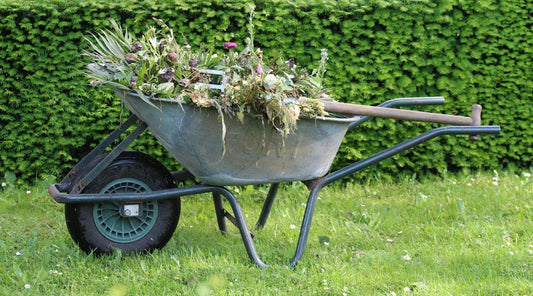Let’s be honest, most of us get annoyed by bugs, and would smash them with a sandal when given the opportunity. There’s a rare few of us out there, though, who appreciate insects for their contribution to the ecosystem, and happily welcome them into our yards and gardens. Of course, some bugs are just a pain (we’re looking at you, whiteflies), and actually do seek out to destroy your hard work. However, in this blog post, we’re going to help you recognize the friendly bugs and let you know what you can do to draw them to your garden.
Ladybugs
There’s a reason that ladybugs are a favorite in the insect community - they’re cute, and they’re relatively harmless. For gardeners, they’re even more loveable because they are one of the top predators for aphids. Even though adult ladybugs do eat aphids, it’s the much less cute larvae that are the real destroyers of pests. A single larvae can easily eat up to 400 aphids before it reaches maturity, while feasting on other pests like spider mites, thrips, and whitefly pupa.
Many gardeners have innocently purchased ladybugs to release into their garden, but that can oftentimes do more harm than good. These “ladybugs” are often actually Asian Lady Beetles, which can bite, infest your home, and compete with native ladybugs for resources. Instead, plant native and bright flowering plants to attract ladybugs to your garden naturally.

Spiders
Although they’re technically arachnids, spiders are often viewed as the most terrifying bugs because of their reputation as poisonous and mean biters. While you may not want them crawling around your bedroom, they’re actually extremely beneficial to have in the garden. Sure, they may occasionally take a bite of you, but they prefer to eat insects, and will help to keep your destructive pests to a minimum.
The only caveat with spiders is that they’ll happily devour the beneficial insects as well. However, keeping a healthy and diverse ecosystem of prey and predator is better for your garden in the long run.
To attract spiders to your garden, consider growing taller plants like beans and corn so that the weaving spiders have a place to build their webs. Hunting spiders need to hide in mulch and ground debris, so make sure to leave some areas of your garden undisturbed by tilling so they can build homes there.

Praying Mantis
Praying manti are our ideal garden predator, partly because their lifespans are from spring to fall when gardeners are growing the most. When they’re young, they like to eat aphids and whiteflies. As they mature, they begin to eat larger pests like beetles and caterpillars. They also won’t do any damage to your plants, as they choose to hunt their prey by camouflaging themselves in (not destroying) the surrounding flora and fauna.
You can help attract praying mantis to your garden by planting anything in the rose or raspberry family. In some locations, however, there may not be any naturally occurring mantis in the area. This is an instance where buying an egg case can be a great option. Ask your local nursery if they sell mantis egg cases before looking for sellers online.

Nematodes
While there are some destructive nematodes out there, the beneficial nematodes are great at attacking garden problems directly in the soil. These creatures are microscopic worm-like insects that enter a “host,” breed, then feast until the host is dead (usually within 48 hours). While this all sounds pretty gruesome, we as gardeners should welcome the carnage. That’s because beneficial nematodes have no negative impact on our plants or humans.
As with Praying Mantis, you can purchase beneficial nematodes and mix them into your soil for a healthier overall garden.

Bees
We saved the best for last! This list wouldn’t be complete without bees. At Yard Butler, we are huge fans, and have an entire article dedicated to growing a bee friendly garden. Bees are the perfect garden insects because they pollinate. Veggies like cucumbers and zucchinis need to be pollinated in order to grow mature fruit, and bees are happy to carry out that duty. Also, despite popular belief, bees have no interest in stinging you unless they feel attacked, so give them some space and they’ll buzz about happily.
To attract bees to your garden, grow patches of brightly colored flowers. These serve as a beacon to the bees that there’s a bounty of pollen for them to harvest. For many more tips to support the bees, be sure to read our previous article.

In the meantime, we hope you’ll consider welcoming these friendly and helpful insects into your garden. After all, a well-balanced ecosystem is the key to any thriving garden.






